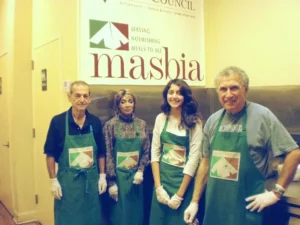Queens Chronicle: Feeding the needy, with charity to all
Posted on: October 9, 2014by Mark Lord

Volunteers serve free kosher meals five days a week at Masbia. Photo by Mark Lord
Gone are the days when soup kitchens were located primarily in lower-income neighborhoods, served only soup and, perhaps, a piece of bread, and conjured images of the Great Depression, with hungry, winter-coated men and women waiting in long lines on snow-covered sidewalks.
Case in point: the Masbia Soup Kitchen Network, which was founded just under a decade ago and opened its latest location, its third, at 98-08 Queens Blvd. in Rego Park in March 2010.
Tucked inauspiciously between a pharmacy and an Indian seafood restaurant, the kitchen could easily be mistaken for just one more restaurant in a neighborhood that overflows with eating establishments.
At the Rego Park location, diners are greeted by a casually dressed maitre d’-like figure who asks them to sign the guest book at a small kiosk before showing them in.
That figure comes in the form of an imposing-looking young man named Goel Golyan, a 26-year-old who started working at Masbia as a volunteer six months ago and was recently promoted to full-time staff member. In addition to welcoming guests, Golyan serves as the kitchen’s masgiach, Hebrew for an on-site inspector of a kosher food service establishment.
Golyan is one of 17 paid employees who keep the three locations, including two in Brooklyn, in running order — with assistance from as many as 50 daily volunteers.
According to Chief Operating Officer Beau Heyen, who oversees programs, staffing and fundraising for the organization, the volunteers are a “fun mix,” from yeshiva students as young as 14 years of age to senior citizens. College students and young professionals often pitch in, as well, he said.
Masbia, a Hebrew word that translates literally into “satiate” and which, according to Heyen, appears in many Jewish prayers, seems an appropriate name for the network.
While the term generally refers to filling one up with food, Heyen said, “We take it to mean how we fill ourselves” with pride over the service the kitchen provides.
Though a kosher-certified kitchen, Masbia serves individuals of all ethnicities and the staff is composed of an equally diverse group. Of the volunteers, Heyen said, “Not all are Jewish or even from New York City. People from across the country make this part of their vacation.”
While the establishment doesn’t seek demographic information from diners, he estimates that “60 to 70 percent are probably Jewish,” adding that a large percentage of those who come into the Rego Park location are of Russian descent. The chef, Ruben Diaz, whom Heyen describes as “phenomenal,” is a Colombian who attended a kosher culinary academy in Flatbush.
“We’re anti-hunger first, kosher second,” Heyen stressed.
A typical menu consists of the traditional soup and bread, but also includes a protein, a starch and a vegetable. Tilapia, chicken, and pastrami are frequent offerings. One recent evening, the main course was chulent, a slow-cooked stew with chicken and pasta, with sides of carrot soup with green peas and a serving of mixed vegetables.
Among those partaking was Luis Valentin, 26, of Corona, who said he comes in for a meal “every now and then.” This visit marked his first in about three weeks, he said.

“The food is great,” Valentin said. “They usually balance it,” and, he added, there is “always plenty” to eat.
He heard about Masbia through word of mouth. “I started coming and I made it a habit,” he said. Currently unemployed, he said that “things are not that great,” adding that he usually comes to Masbia because of a need to “relieve your pocket every now and then.”
Rego Park resident Diana Ilyad said of her first encounter with Masbia, “I just passed by. I thought it was a restaurant. It looks like a restaurant.” Now, she eats there a couple of times a month. She appreciates the “good, clean food,” adding, “They’re fast. They’re good to everybody.”
An elderly woman, also from the neighborhood, didn’t want to give her name but explained, “In the beginning it was perfect, but now it’s just …” completing her thought with a hand gesture that indicated mediocrity. “One cannot expect to have it like we would like to have it.”
In addition to the hot meals that are served at the site, which would probably be described in a restaurant review as “plain, simple and clean,” Masbia has a pantry program that kicks into action once a week, usually on Thursday, to help those in need get through Friday and Saturday, when the establishment is closed.
“We do a shopping list model in six languages,” Heyen said, naming English, Hebrew, Yiddish, Chinese, Spanish and Russian, “and in pictures” for those who speak other tongues. Each pantry bag is designed to contain nine meals per person, he said. For a family of two, that translates into 15 pounds of food, including fruits and vegetables, grains and proteins.
According to Heyen, the Rego Park location distributes more pantry bags than either of the other two sites. And it has served 23,000 hot meals so far this year alone.
The volunteers seem to get a great deal of personal satisfaction from what they do. One of them, Efna Plaza, who retired as a post office supervisor at JFK Airport, admitted, “This is a whole different world for me. It was a concept for me — hungry people.” Upon meeting them one-on-one she has found, “They’re just regular people down on their luck.”
Ninety percent of the funding for the kitchen comes from private donors, including corporations and individuals, Heyen said. The remainder comes from federal, state and local emergency food funding. “The City Council does very well for us,” Heyen said, adding that philanthropists Henry and Susie Orenstein are the prime underwriters for the Rego Park location, “the reason we were able to come here.”
He added that “our model connects better with people” than more traditional soup kitchens. “For 30 minutes, people can forget the horrible world outside.”
During regular hours of operation, hot meals are available Sunday through Thursday from 3 to 7:30 p.m., with distribution of pantry bags beginning at 11 a.m. on Thursdays.
View the original post HERE.




